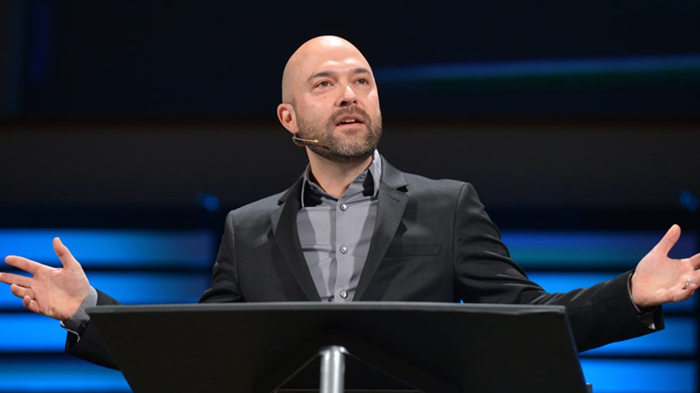
At 40 years old, Joshua Harris has already pastored a megachurch for a decade and authored six books, including the bestselling I Kissed Dating Goodbye. Now, he wants to go to college.
“I have lived a sort of backwards life. Without meaning to, I have experienced life out of the normal order and sequence of events,” Harris told attendees at Covenant Life Church (CLC) in Gaithersburg, Maryland, on Sunday, January 25. “I haven’t completed any post-graduate study. I don’t even have an undergraduate degree. In fact, I have never attended a formal school full-time in my life.” [Full statement]
Harris, who was homeschooled, has enrolled at Regent College in Vancouver, British Columbia, for the fall of 2015. His last day as CLC senior pastor will be in April. He leaves with his church's blessing.
Harris began his “crazy, backwards life” in high school when he began publishing his own magazine geared toward fellow homeschoolers. He broke onto the national scene in 1997, at the age of 21, when he published I Kissed Dating Goodbye. The book became a runaway hit. Shortly thereafter, Harris connected with C. J. Mahaney, the founder of CLC and Sovereign Grace Ministries (SGM).
“Like me, [Mahaney] had never received formal theological training, and the group of churches he led, which grew out of the Jesus Movement in the 1970s, at that time didn’t place a high value on seminary training,” said Harris. “So instead of attending seminary before becoming a pastor, I moved into C. J.’s basement, worked as an intern in the church, traveled the country with him and began preaching. It was on the job training and I soaked up everything C. J. taught me.”
Mahaney stepped down as CLC's senior pastor in 2004, and a 29-year-old Harris took over the 3000-member congregation “with no formal theological training and no formal training in organizational leadership.”
In 2011, Harris resigned from SGM's board, just weeks after Mahaney took a leave of absence as president of SGM in order to address "various expressions of pride." (Mahaney returned after six months, and later left SGM leadership in 2013.) In Harris’s first sermon after Mahaney's resignation, he said that "our denomination is being publicly spanked, we are being humiliated and being brought low,” according to multiple bloggers.
In December 2012, CLC withdrew from SGM after former attendees of the network’s churches, including CLC, filed a lawsuit alleging that the ministry’s leaders conspired to conceal the sexual abuse of children.
Six months later, Harris disclosed that he had been a victim of sex abuse and encouraged victims to go to the police in the wake of a Maryland judge dismissing the lawsuit’s claims against SGM due to statute of limitations.
Harris and Mahaney both stepped down from The Gospel Coalition's council in 2014 after former CLC youth group leader Nathaniel Morales was convicted on five counts of sexual abuse against three boys between 1983 and 1991. During the trial, Grant Layman, Mahaney's brother-in-law and former CLC pastor, admitted under oath that he had not reported alleged sex abuse allegations.
Harris acknowledged that Layman’s testimony “seemingly contradicts our past communications about the sequence of events involved.”
“I'm not going to at this time try to make some definitive statement until we can clear this up. But please know that there was no attempt to give misinformation and we are committed to clarifying this and if this turns out that the statement was wrong, I will take full responsibility for that,” he said in a sermon shortly after the conviction.
In a thorough Washington Post profile about his decision to step down as CLC’s pastor, Harris suggested that SGM’s lack of denominational structure likely affected how the church responded to the abuse allegations and lawsuit. Harris described CLC as a “a mom-and-pop structure that grew exponentially,” and suggested that it would have been helpful for the church to have had the input of others, something he said he looks forward to when he becomes a Regent student.
“I’m looking at my own training and saying: ‘I want to get a broader perspective…. I want to learn other ways of how pastors and other leaders deal with all these things.’ ... We need to learn from the historic church about ways that there is better accountability and responsibility,” he said.
Harris said he planned to attend for at least a year, with the possibility of staying to pursue a masters degree.
CT’s sister publications Leadership Journal and SeminaryGradSchool.com have previously explored what preparation ministers need today, what changes in seminary education mean for classic pastoral degrees, whether we still need seminaries and whether seminary education is always necessary for pastoral ministry. Ed Stetzer has argued why church planting may lead us to consider a new way to credential pastors. Her.meneutics examined why we should be concerned that women remain outnumbered in theological education.

Support Our Work
Subscribe to CT for less than $4.25/month


















